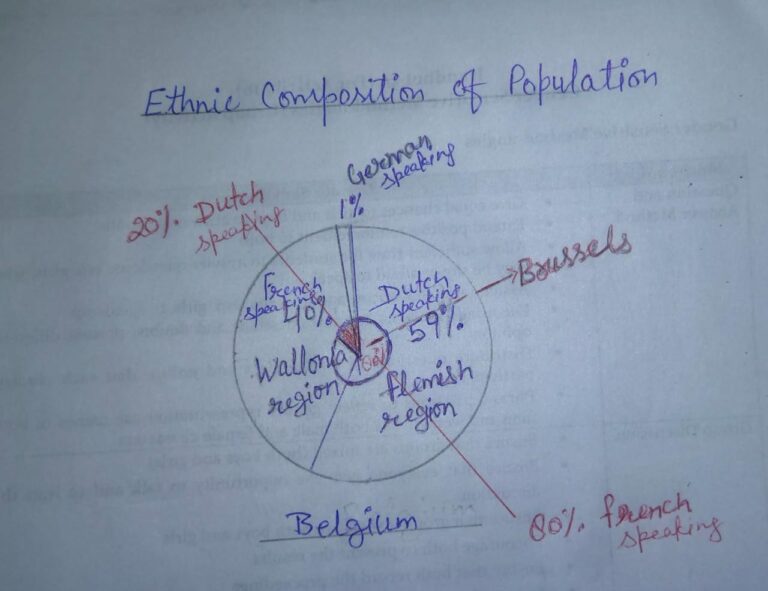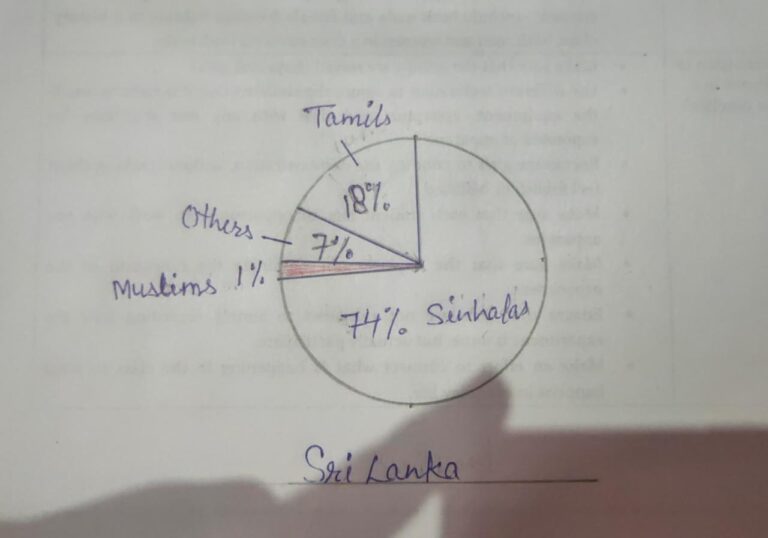Checkout handpicked notes of NCERT Class 10 Pol Science chapter 1 notes – Power Sharing by Vibha Madam, and don’t forget to share your valuable comments in the comment below to motivate our author.
Definition of Power Sharing
Power sharing means sharing the responsibilities and powers among the different organs and levels of government
It is a strategy of resolving disputes over exercising of powers.
It is a powerful approach to unite the diversities.
Comparison of allocation of power sharing between two Countries
a) Belgium – Community government
Results as peaceful solution of tension.
b) Sri-Lanka – Majoritarianism
Results as Civil War and Economic crisis.
Ethnic composition of Belgium
- Dutch speaking 59% in Flemish region.
- French speaking 40% in Wallonia region.
- German-speaking 1%
In capital city Brussels
- French speaking 80%
- Dutche speaking 20%

Ethnic tension in Belgium
- Economic inequality between the Dutch speaking and French speaking.
- At the capital city of Brussels the French speaking community was relatively rich and powerful and used to get the economic and educational benefits.
Accommodation in Belgium – Belgian model
(Power Sharing in Belgium)
- The constitution amended four times between 1970 to 1993.
- Equal representation to both Dutch and French in the Central government.
- The central government shared its power with the State Government.
- Brussels has a separate government in which both the communities have equal representation.
- There is a third kind of government, This is called “Community government”. This government has the power regarding cultural, educational and language related issues.
Ethnic composition of Sri Lanka
Sinhala 74%
- Buddhist
- Christians
Tamil speakers 18% (Hindus, Muslims, Christians)
- Indian Tamils 5%
- Native Tamils ( Sri-Lankan Tamils) 13%
Others 7%
- Christians both Tamil and Sinhala
Muslims 1%

Reasons for “the Alienation” of Sri Lankan Tamils
- After independence in 1948, the democratically elected Sri Lankan Government adopted a series of majoritarian measures to establish Sinhala supremacy by passing an act in 1956.
Definition of Majoritarianism
It is the belief that the majority community should be able to rule the country. In simple words, Supporting the dominance of majority over the minority.
Majoritarian measures of Sri Lankan Government
- Sinhala as the official language.
- Preferential policy for Sinhala applicants.
- Buddhism as the National religion.
Demands of Sri Lankan Tamils
- Recognition of Tamil as an official language.
- Regional autonomy
- Equality of opportunity in securing education and jobs.
Civil War
- In order to protest for their demand they started a political struggle in the way of conflict with the government.
- By 1980s ,several political organisations were formed demanding and independence Tamil Eelam( state) in Northern and the Eastern part of Sri Lanka.
- The distrust between the two communities turn into widespread conflict, it soon turned into a Civil War.
Result of Civil War
- Thousands of people of both the communities were killed
- Many families were forced to leave the country as refugee and many more lost their livelihood.
- After the Civil War, the Sri Lanka suffered from an economic crisis.
Why Power Sharing is Desirable
a) Prudential Reasons
- Avoids conflict.
- Ensures political stability.
- Majority cannot rule over minority.
b) Moral Reasons
- Spirits of democracy.
- Ensures legitimate government.

Forms of Power Sharing
a) Horizontal distribution of power
- Legislature
- Executive
- Judiciary
b) Vertical division of power
- Union government
- State government
- Local government
c) Power shares among different social groups
- Religious
- Linguistic
- Gender
d) Power sharing arrangements can be seen among the “political parties, pressure groups and social movements”. They influence the government on the decision- making process.
Conclusion
Power sharing is desirable because this arrangement ensures the promotion and protection of cultural, social and linguistic diversity
Stay tuned for more notes, quotes & articles like this.
For writing with us login to our website and start writing today.
For any kind of query or post related queries, you can also DM us at our Official Instagram by clicking here.
For sponsor any article or your article you can mail us with your logo ready and details.




Thanks maam for the notes
Thanks mam for notes…I really appreciate your efforts…👍
Thanks mam for notes…I really appreciate your efforts…👍
Best 👍💯💯
Mam ur efforts are appreciable… thanks a lot for giving ur precious time to prepare these notes….these point to point notes helps to learn and understand easily👍
Thanks mam, I easily understood the notes.
Thank u mam❤️❤️
mam online tuition chahiye hume kaise contact kre
Hi, Niharika
You can mail us by clicking here
with your location, class and subject and also no. of students who are looking for tuition
and we will let you know after consulting with our author.
thnk u mam to giving me easily understood notes.☺️
really fantastic notes
simple and lucid
Thanks a lot maam
thanks ma’am your notes is really fantastic
excellent maam
awesome
easy to understand and amazing notes